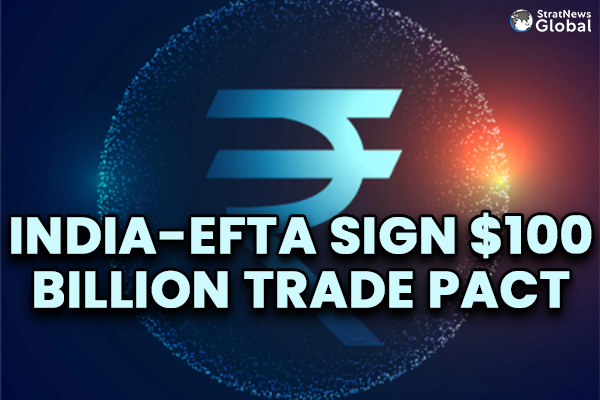India and the European Free Trade Association (EFTA) bloc — comprising Iceland, Liechtenstein, Norway and Switzerland — have signed a free-trade agreement.
Describing the agreement as a “watershed moment in bilateral relationship between India and EFTA”, Prime Minister Narendra Modi said that it “symbolises commitment to open, fair and free trade”.
Commerce Minister Piyush Goyal said that the agreement was the first of its kind where there has been a binding commitment to invest $100 billion in India in the next 15 years in sectors related to pharma, food processing, engineering and chemicals.
Stronger Ties Inked!
Delighted to sign the India-EFTA Trade & Economic Partnership Agreement, yet another pact of progress for our nation.
This watershed agreement, realised under the guidance & leadership of PM @NarendraModi ji, marks the dawn of a new era of prosperity and… pic.twitter.com/4h6FKoVAIO
— Piyush Goyal (मोदी का परिवार) (@PiyushGoyal) March 10, 2024
“EFTA countries gain market access to a major growth market. Our companies strive to diversify their supply chains while rendering them more resilient. India, in return, will attract more foreign investment from EFTA, which will ultimately translate into an increase in good jobs,” federal councillor Guy Parmelin, speaking on behalf of the EFTA said.
The deal is likely to facilitate the creation of 10 lakh direct jobs. The investment is expected to draw largely from provident funds (PFs) in EFTA countries that comprise Iceland, Liechtenstein, Norway and Switzerland, in exchange for market access into India.
India has a negative balance of trade with these countries, exporting less than $2 billion worth of goods last year and importing around $20 billion. India evidently hopes that a deal of this kind could boost exports and bring more equity in the trade balance.
India has a few trade agreements lined up with Mauritius, Australia, and the United Arab Emirates, while the one with Canada and the UK have been delayed.
None of the countries are part of the EU, EFTA basically is an intergovernmental body for the promotion and deepening of free trade. The trade deal with the EU was suspended in 2013 “due to a gap in ambition,” according to a report on the website of the European Union.
India and EFTA have been negotiating the trade deal since January 2008. The 21st round of negotiations was held here in January on chapters including trade in goods, rules of origin, trade and sustainable development, intellectual property rights, and trade facilitation.
















